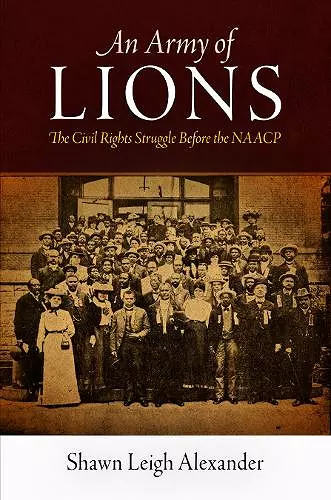An Army of Lions
The Civil Rights Struggle Before the NAACP
Format:Paperback
Publisher:University of Pennsylvania Press
Published:14th Mar '13
Currently unavailable, and unfortunately no date known when it will be back

In 1890, a delegation of African American activists formed the Afro-American League, the nation's first national civil rights organization. Over the course of nearly two decades, these activists fought to end disfranchisement and segregation, and to contest racial violence, creating the foundation for the NAACP and the modern civil rights movement.
In January 1890, journalist T. Thomas Fortune stood before a delegation of African American activists in Chicago and declared, "We know our rights and have the courage to defend them," as together they formed the Afro-American League, the nation's first national civil rights organization. Over the next two decades, Fortune and his fellow activists organized, agitated, and, in the process, created the foundation for the modern civil rights movement.
An Army of Lions: The Civil Rights Struggle Before the NAACP traces the history of this first generation of activists and the organizations they formed to give the most comprehensive account of black America's struggle for civil rights from the end of Reconstruction to the formation of the National Association for the Advancement of Colored People in 1909. Here a host of leaders neglected by posterity—Bishop Alexander Walters, Mary Church Terrell, Jesse Lawson, Lewis G. Jordan, Kelly Miller, George H. White, Frederick McGhee, Archibald Grimké—worked alongside the more familiar figures of Ida B. Wells-Barnett, W. E. B. Du Bois, and Booker T. Washington, who are viewed through a fresh lens.
As Jim Crow curtailed modes of political protest and legal redress, members of the Afro-American League and the organizations that formed in its wake—including the Afro-American Council, the Niagara Movement, the Constitution League, and the Committee of Twelve—used propaganda, moral suasion, boycotts, lobbying, electoral office, and the courts, as well as the call for self-defense, to end disfranchisement, segregation, and racial violence. In the process, the League and the organizations it spawned provided the ideological and strategic blueprint of the NAACP and the struggle for civil rights in the twentieth century, demonstrating that there was significant and effective agitation during "the age of accommodation."
"An Army of Lions is a stunning and heroic work of research about one of the great 'origins' stories of American history. With remarkable originality, Alexander illuminates the grassroots civil rights organizations, leadership, and strategies in the nineteenth century, well before we typically think about those efforts. In the hands of this very talented historian, we see that T. Thomas Fortune and others struggled with the same questions that occupied the later generations of Du Bois and King. This is a scholarly achievement of the first order, with wide social and political implications today." * David W. Blight, author of American Oracle: The Civil War in the Civil Rights Era *
"With impressive detail, An Army of Lions documents a complex era in African American politics during the late nineteenth and early twentieth centuries. Alexander offers readers invaluable insights into how African American activists responded to the rising violence, disfranchisement, and segregation that characterized the Jim Crow era. Most importantly, he helps us to see how a broad range of early civil rights organizations were vying with one another for national leadership, political access, and mass support." * Martha S. Jones, University of Michigan *
"In his excellent study, Shawn Leigh Alexander recovers the history of the civil rights organizations that emerged in the United States between the 1880s and 1909 . . . and in doing so sheds new light on the origins of the NAACP and its strategies for battling racism and on the nature of black politics during the Nadir." * Journal of American History *
"Alexander's extremely rich monograph unravels the complex ideological, personal, and institutional features of grassroots African American civil rights organization, leadership, and protest during what historian Rayford W. Logan termed the 'nadir' of race relations in the US, the era of Jim Crow. . . . Alexander's great accomplishment is in his digging more deeply into the primary sources-especially newspapers-and in establishing a wider context for early black activist and protest groups that culminated in the formation of the National Association for the Advancement of Colored People." * Choice *
"An Army of Lions should catapult its author, Shawn Leigh Alexander, to the forefront of young scholars of African American history. This brilliant narrative successfully demonstrates that black activists formed national civil rights organizations predating DuBois's Niagara Movement and the National Association for the Advancement of Colored People." * The North Carolina Historical Review *
"Alexander's major accomplishment is to place Booker T. Washington, seen as a conservative black leader, into a more progressive debate as he was often involved, albeit covertly, with more militant civil rights organizations." * American Historical Review *
"In detailing the organizational history that lay behind the founding of the NAACP, An Army of Lions provides a compelling narrative that will appeal to historians, sociologists, and scholars of rhetoric alike. Alexander's account emphasizes both the continuity in rhetorical strategies between the Afro-American Council and the NAACP, and the institutional context from which these continuities emerged. But perhaps most importantly, Alexander turns our attention to early and often-overlooked episodes in civil rights history, episodes that contributed in important ways to our understanding of civil rights in the present." * Rhetoric & Public Affairs *
ISBN: 9780812222449
Dimensions: unknown
Weight: unknown
408 pages